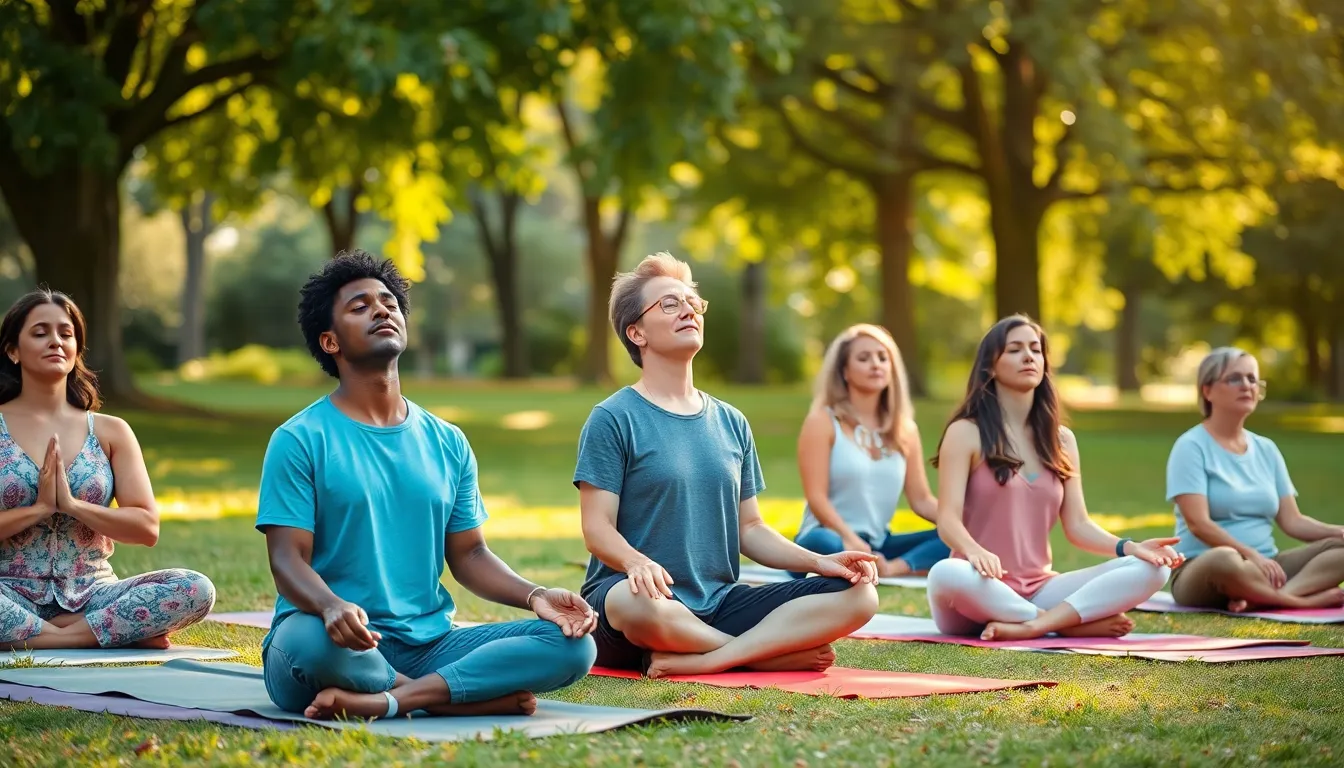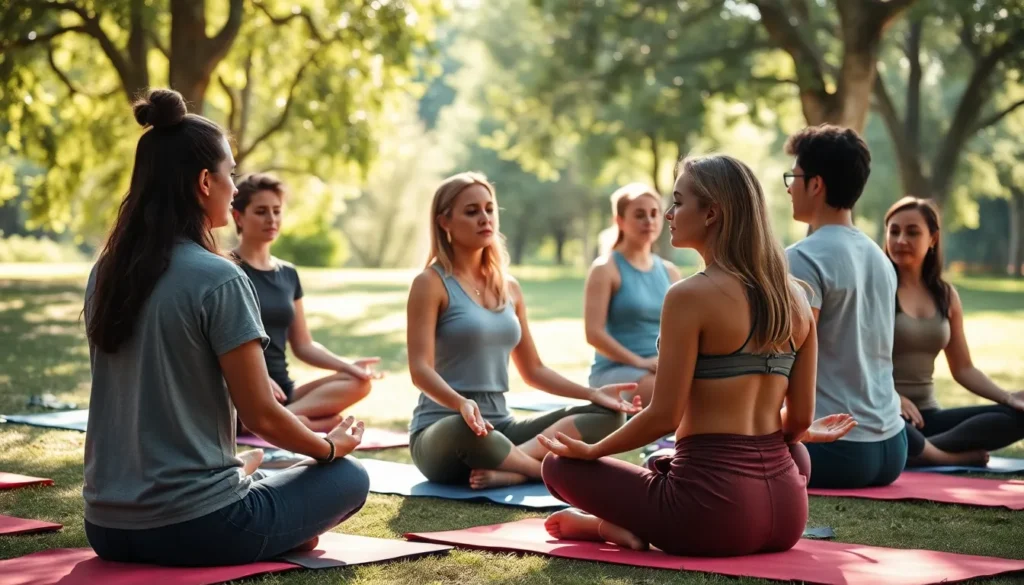In a world buzzing with distractions and relentless to-do lists, finding a moment of peace can feel like searching for a needle in a haystack. Enter mindfulness practices—a magical toolkit that promises to transform chaos into calm. Imagine mastering the art of staying present while your phone pings like a hyperactive toddler. Sounds dreamy, right?
A mindfulness practices course offers just that. It’s not about sitting cross-legged on a mountaintop (though that does sound nice). Instead, it’s about integrating simple, effective techniques into daily life. Whether you’re looking to reduce stress, boost creativity, or simply stop losing your keys every five minutes, this course has got you covered. Get ready to embrace the power of now and discover a more centered, focused version of yourself. Who knew tranquility could be this fun?
Table of Contents
ToggleOverview of Mindfulness Practices Course
A mindfulness practices course equips individuals with essential techniques to cultivate awareness and presence in daily life. Participants learn to embrace the present moment instead of getting lost in distractions. Various mindfulness exercises, such as meditation, breathing techniques, and body scans, form the core of the curriculum.
Stress reduction remains a primary goal, as participants explore methods to manage anxiety and foster calmness. Enhanced creativity naturally emerges during the course, as a focused mind allows for innovative thinking. Focus improvement significantly benefits as techniques aid in maintaining attention on tasks.
Structured sessions offer a supportive environment where individuals can share experiences and learn from each other. Participants practice mindfulness in manageable segments, ensuring skills develop gradually. Practical applications of mindfulness in everyday situations enhance the overall learning experience.
Instructors lead discussions on the science behind mindfulness, highlighting its benefits on mental and emotional well-being. Personal growth thrives in such courses, as individuals not only learn to cope with stress but also discover deeper connections to themselves and others.
Following completion, participants typically report increased satisfaction in their lives. Enhanced concentration, creativity, and stress management become valuable tools, empowering individuals in both personal and professional settings. Adopting mindfulness leads to a more centered and fulfilling daily existence.
Benefits of Mindfulness Practices

Mindfulness practices offer numerous advantages that enhance overall well-being. Participants experience transformative effects on both mental and physical health.
Mental Health Advantages
Engaging in mindfulness practices leads to significant improvements in mental health. Research indicates that these techniques reduce symptoms of anxiety and depression. Practitioners often report greater emotional resilience and a marked increase in feelings of happiness. Focused meditation exercises help individuals manage racing thoughts and promote clarity. Enhanced self-awareness emerges as participants cultivate a deeper understanding of their emotions and thought patterns. Regular practice fosters a sense of grounding, allowing individuals to respond skillfully to challenging situations.
Physical Health Benefits
Mindfulness practices contribute positively to physical health. Studies show that these techniques can lower blood pressure and improve sleep quality. Regular practice can also support the immune system, reducing the incidence of illness. Individuals frequently notice decreased tension in their bodies, which contributes to overall relaxation. Specific breathing techniques enhance lung capacity and promote better respiratory function. Participants often report heightened energy levels, enabling them to engage more fully in daily activities. Improved physical health serves as a foundation for a more balanced and fulfilling lifestyle.
Course Structure and Content
The mindfulness practices course provides a well-organized framework for enhancing awareness and presence in daily life. Participants engage in a variety of modules designed to build essential mindfulness skills.
Modules and Topics Covered
Each module covers specific topics related to mindfulness. Meditation practices emphasize techniques for calming the mind. Breathing exercises focus on controlling breath to achieve relaxation. Body scan activities teach individuals to develop awareness of physical sensations. Other topics include stress management strategies and cultivating emotional resilience. While learning the science behind mindfulness, participants discover its positive effects on mental and emotional health. Group discussions allow for shared insights and personal experiences, enriching the learning environment.
Duration and Format
Structured over six weeks, the course consists of one session per week lasting 90 minutes each. Participants experience a blend of interactive discussions and guided practices. Online or in-person formats offer flexibility, accommodating different preferences. Participants may engage in group activities or individual reflection, enhancing their mindfulness journey. Assignments between sessions encourage daily practice and integration of learned techniques into everyday life.
Teaching Methods and Techniques
Various teaching methods and techniques enhance participants’ mindfulness journey. These methods include structured approaches that provide clarity and support throughout the course.
Guided Meditations
Guided meditations form a foundational aspect of the mindfulness practices course. Instructors lead participants through various meditation sessions, fostering comfort and focus. Techniques include visualization, breath awareness, and mindful observation. Each session caters to different needs, allowing individuals to connect with their thoughts and feelings on deeper levels. Participants often express that these meditations enhance their ability to concentrate and cultivate inner peace.
Practical Exercises
Practical exercises are essential for developing mindfulness skills. Activities range from mindful walking to journaling, encouraging participants to engage with their surroundings. Simple exercises like breathing techniques and body scans help anchor awareness in the present moment. Group discussions following these activities provide opportunities for sharing insights and learning from experiences. Every exercise aims to reinforce stress management strategies and emotional resilience. Participants walk away equipped with practical tools they can implement in everyday life.
User Experience and Testimonials
Participants frequently express transformative experiences through the mindfulness practices course. One individual noted significant reductions in anxiety, sharing, “I’ve learned to ground myself during stressful moments.” This newfound ability enhances not just their personal life, but also professional performance.
Feedback highlights the supportive environment provided in the sessions. Many feel encouraged by their peers and instructors, which fosters openness in discussions. Another participant mentioned, “Hearing others share their journeys helped me realize I’m not alone.” Shared experiences build community, enhancing the overall course impact.
Improvement in focus surfaces as a prevalent theme in testimonials. Individuals report noticeable changes in their concentration abilities. “I can now finish tasks without becoming easily distracted,” one participant stated. This enhancement positively affects productivity at work and home.
The practical techniques taught create lasting change. After implementing body scans and breathing exercises, several participants observed better emotional regulation. “Whenever I feel overwhelmed, I return to the breathing exercises,” a participant commented, emphasizing utility. Engaging in daily practices reinforces learning and integration into everyday life.
Moreover, participants often speak about heightened self-awareness. Gaining clarity about thoughts and emotions stands out as a key benefit. One participant articulated, “I’ve developed a deeper understanding of my triggers.” Enhanced self-awareness leads to healthier responses to stressors.
Positive testimonials consistently underline the course’s effectiveness in promoting mindfulness. Many individuals appreciate the balance between structured learning and personal growth. Participants leave equipped with valuable tools that boost well-being, encouraging others to consider enrollment.
Embracing mindfulness practices can profoundly transform one’s life. By participating in a structured mindfulness practices course, individuals gain essential tools for managing stress and enhancing emotional well-being. The supportive environment fosters community and encourages personal growth, making it easier to integrate these techniques into daily routines.
As participants learn to cultivate awareness and presence, they often experience improved focus and creativity. The benefits extend beyond the course, equipping individuals with lifelong skills that promote a balanced and fulfilling lifestyle. With numerous testimonials highlighting positive changes, it’s clear that investing in mindfulness is a step toward a more centered and enjoyable existence.





